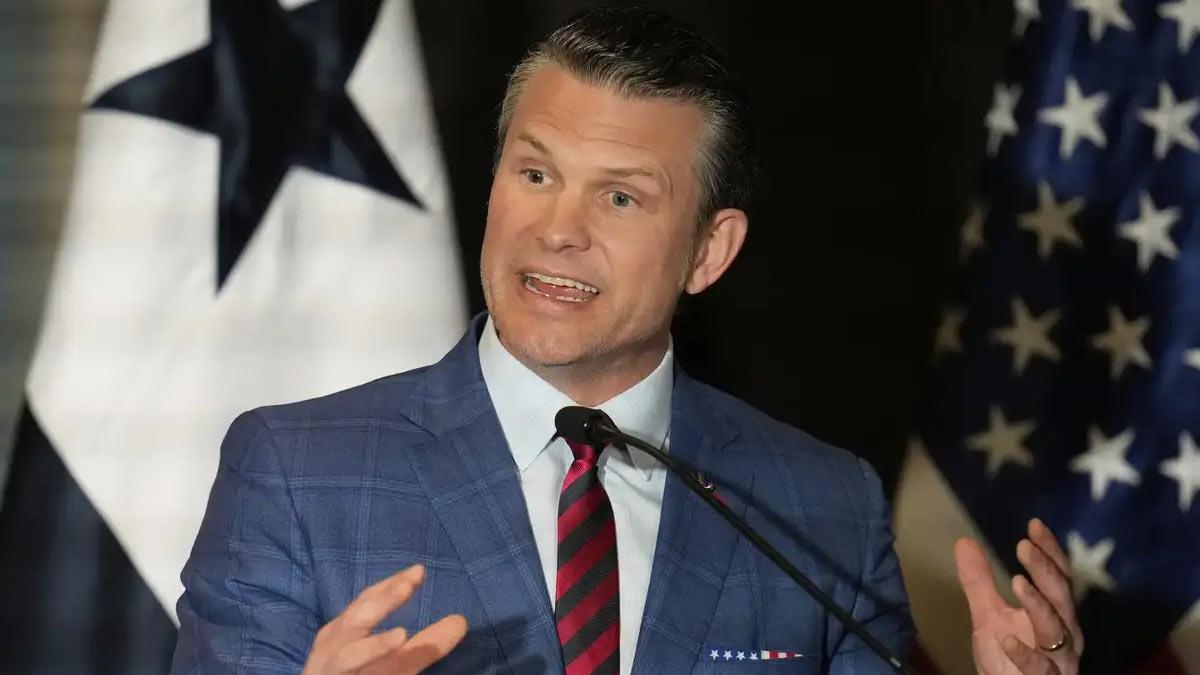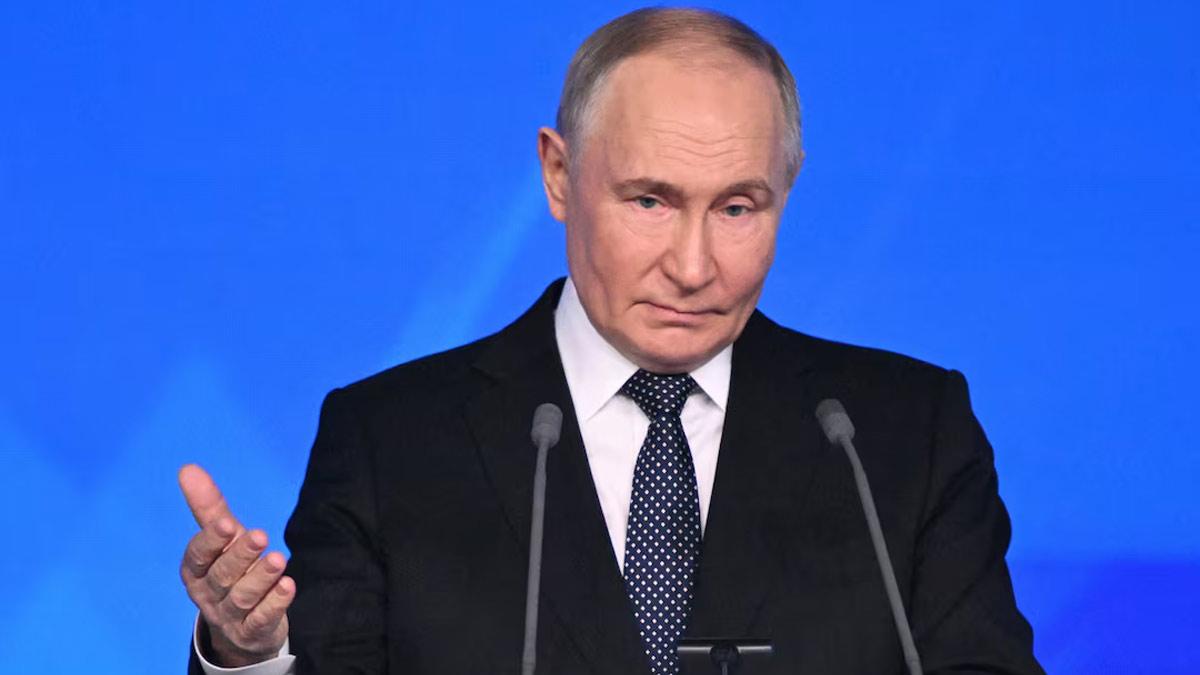At the Shangri-La Dialogue in Singapore on Saturday, U.S. Defense Secretary Pete Hegseth made a stern warning that the United States is ready to "fight and win" against China if its deterrence plan were to fail.
He appealed to America's regional allies to boost military collaboration and significantly increase defense spending.
In his speech at the high-profile defense gathering, Hegseth emphasized Washington's strong commitment to bolstering security structures throughout the Indo-Pacific, pointing to the global resurgence of conflict — from Russia's continued aggression in Ukraine to the Gaza war — as proof that an ever-more volatile world order is on the horizon.
Emphasizing the American long-term presence in the area, Hegseth further slammed the missing presence of China's highest defense representative. "We are here this morning. Somebody else isn't," he said, highlighting Beijing's no-show.
The Pentagon leader made an authoritative call to the region's defense and political leadership to respond quickly to China's growing assertiveness, above all in the South China Sea and concerning Taiwan.
"China has shown that it wants to fundamentally upend the status quo in the region. We cannot turn a blind eye and we cannot pretend not to see it. China's behavior towards the world and its neighbors is a wake-up call and an urgent one," Hegseth threatened.
"We urge, and we insist that our partners and allies do their share on defense," he stressed. "Our defense expenditures must be commensurate with the threats and risks that we face today, because deterrence does not come cheap."
These words come as increasing economic tensions between China and the U.S. hit a new level amid recent hopes for breakthrough following a temporary truce on tariffs beginning to lose steam. Treasury Secretary Scott Bessent said on Thursday that U.S.-China trade talks "are a bit stalled," implying the higher-level engagement will be necessary in order to break the impasse.
Hegseth said China's behavior in the South China Sea erodes sovereign claims and threatens freedom of navigation and overflight. He went on to refer to China's military exercises around Taiwan as part of an evident agenda to ramp up pressure on the self-ruled island.
In the unusual departure from international affairs, Hegseth promised to halt what he characterized as China's "malign" presence along the Panama Canal. "It is key terrain, after all, China did not construct that canal. We did, and we will not let China weaponize it or dominate it," he said.
Earlier in March, China had responded to rising tensions by declaring it was ready to confront the U.S. across all fronts. “If war is what the U.S. wants, be it a tariff war, a trade war or any other type of war, we’re ready to fight till the end,” the Chinese Embassy in Washington said at the time.
Beijing Skips Major Security Gathering
China's Defense Minister Dong Jun was conspicuously absent from the Shangri-La Dialogue this year, the first such instance since 2019 when Beijing's highest defense official failed to participate. A delegation headed by Major General Hu Gangfeng, the Vice President of China's National Defense University, was instead sent to represent Beijing.
Hu will later on Saturday participate in a session on maritime cooperation in the Asia-Pacific region.
Dong's non-appearance has created doubt on whether direct interaction between American and Chinese defense officials would be possible, a departure from last year when the then-U.S. Secretary of Defense Lloyd Austin met Dong to pursue military talks.
It is said by experts that China's choice to not send its leader of the armed forces might be intended to avoid confrontation regarding sensitive issues such as Taiwan and the South China Sea.
"Beijing is always trying to own the narrative and dialogue. Shangri-La won't let it," said Drew Thompson, a senior fellow at the S. Rajaratnam School of International Studies and a former U.S. Defense Department official.
Recalling a previous encounter with a Chinese military counterpart, Thompson continued, "When I was at DoD, my PLA counterpart once told me what they didn't like. He said, 'we don't like being made out to be gladiators fighting each other for others' entertainment. We want to resolve our differences bilaterally, in channels, not in public forums.'"
Wu Xinbo, director of the Center for American Studies at Fudan University, pointed out recently that China sees limited strategic benefit to participating in the summit. Rather, Beijing seems to be focusing on other venues to push forward its regional influence without the participation of the U.S.
Escalating Tensions Over Taiwan
Washington is set to unveil a major spike in the sale of arms to Taiwan, hoping to top the $18.3 billion in defense sales approved during Donald Trump's first term and surpassing the $8.4 billion approved under President Joe Biden, according to Reuters.
The envisioned military aid should center on low-cost and pragmatic weapons systems — such as missiles, unmanned aerial vehicles, and ammunition — to enhance Taiwan's capacity to deter Chinese attacks.
The U.S. has traditionally been a key supporter and arms supplier to Taiwan, a policy which has always attracted fierce criticism from Beijing. Chinese authorities remain adamant in demanding the cessation of these arms deliveries, blaming Washington for kindling instability across the Taiwan Strait.
The Beijing administration asserts sovereignty over Taiwan and has refused to exclude the use of military force to drive pursuit of so-called "reunification" with the island. The Taiwanese administration has consistently rejected these assertions and maintains its autonomy.
China has progressively ratcheted up its military presence around Taiwan year after year, regularly sending warplanes and naval units into areas proximate to the island.
During last year's Shangri-La Dialogue, Defense Minister Dong threatened that any effort to isolate Taiwan from China would lead to "self-destruction," describing the Taiwan question as "the core of our core interest.
In the midst of these changes, alarms have been raised over Donald Trump's current position on Taiwan. During the campaign, Trump indicated that Taiwan should pay its own way in terms of protection and scolded the island for appropriating America's semiconductor business — words that have drawn unease in Taipei.
Read also| Trump to Impose 50% Tariff on Steel Imports Starting June 4 to Protect U.S. Industry
Read also| Trump Ends 'Mr. Nice Guy' Approach, Accuses China of Violating Trade Agreement


















